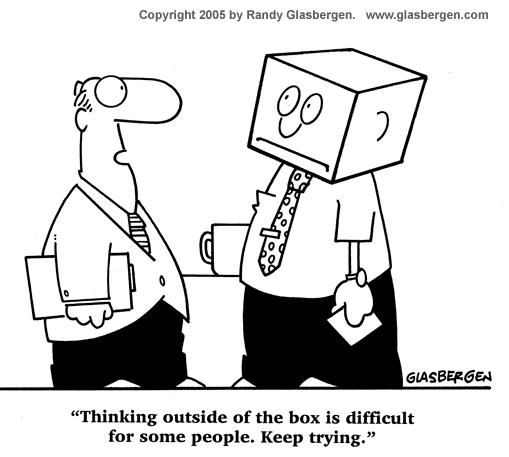One of the most oft-repeated advice for students and postdocs on a career search is to NETWORK, NETWORK, NETWORK. Our bloggers have written up several posts about different arranged networking events such as the BioHUB networking event for people who work in the life sciences field, the INet NYC networking event for international students and postdocs, and the BioNJ and Rutgers job fairs. We also have posts on how to network online using social media, and how to take a more directed approach through informational interviews. But what we are overlooking, or just flat out don’t realize, is that the opportunity to network is everywhere, and is not limited to professional or organized networking events. Here are some examples of “networking outside the box”. 
 In the laboratory/work setting Working in a laboratory is not a solitary undertaking. When you first join the lab, you may work with a senior member of the lab who will mentor you, there will be other researchers, postdocs, and students, and you in turn will get your own students to mentor. These will be the people who will see you and interact with you every day for several years. If we take a LinkedIn analogy, these people are considered your 1st-degree connections. You can extend this area to include everyone in your whole building, or department, and consider each person you interact with throughout your graduate school as a connection. Of course, it goes without saying that your PI and committee members, and professors fall into this category. People who also belong in this category but who you may overlook are the sales representatives that visit the lab every once in a while. These are people who may be working in companies that you might be interested in working for in the future, and so it is very important to include them in your network. In settings still closely related to work During the course of your graduate school life, you will inevitably present your work in different seminars, symposia, and conferences. Most of us are already aware that these sorts of gatherings are important avenues not only for learning more about the different work in our field, but equally important for networking, collaboration opportunities, and possibly meeting your potential employer. I would also just like to mention briefly that joining professional societies is another way of networking, as this has been discussed in detail in a previous iJOBS post. Lastly, we should not forget that we are all alumni of some school or university, where we completed our BS or MS degrees (or even go as far back as your high school!). Those professors, classmates, and other people you have interacted and developed relationships with are also part of your network! Settings outside work Although it may seem as though you only interact with fellow scientists during your time in grad school, this is not the case. Even if we don’t realize it, we have many opportunities for networking with people outside of our profession. Here are some examples: Family/Relatives Unless you come from a scientific family, chances are your parents, uncles, aunts, and cousins are all doing non-science related work. Now, in my case, these are the people who have known me the longest, and since I come from a pretty big family, I am related to people who work in pretty much every field possible. These people are a part of my network, and even they greatly expand the possibilities that I will be introduced to people outside my field. For example, my parents and several of my aunts and cousins all work in the medical and healthcare field. If ever I decide to go into a more translational or medical research, they will be able to provide me with additional information that may not otherwise be available to me. They also provide a different perspective, which is necessary if you aim to transition out of academia. Non-academic clubs/teams/societies To give an example of this, I played intramural soccer for several years during grad school, and the people on my team were also graduate students, but from different fields such as physics or mathematics. However, I have kept in touch with them, and some of them are doing postdoctoral work in universities, or are working in industry. Neighbors, church-goers, grocery, local restaurants, etc As a last example, I met a biologist who works in industry because she was a neighbor and we took some recreational classes together.
In the laboratory/work setting Working in a laboratory is not a solitary undertaking. When you first join the lab, you may work with a senior member of the lab who will mentor you, there will be other researchers, postdocs, and students, and you in turn will get your own students to mentor. These will be the people who will see you and interact with you every day for several years. If we take a LinkedIn analogy, these people are considered your 1st-degree connections. You can extend this area to include everyone in your whole building, or department, and consider each person you interact with throughout your graduate school as a connection. Of course, it goes without saying that your PI and committee members, and professors fall into this category. People who also belong in this category but who you may overlook are the sales representatives that visit the lab every once in a while. These are people who may be working in companies that you might be interested in working for in the future, and so it is very important to include them in your network. In settings still closely related to work During the course of your graduate school life, you will inevitably present your work in different seminars, symposia, and conferences. Most of us are already aware that these sorts of gatherings are important avenues not only for learning more about the different work in our field, but equally important for networking, collaboration opportunities, and possibly meeting your potential employer. I would also just like to mention briefly that joining professional societies is another way of networking, as this has been discussed in detail in a previous iJOBS post. Lastly, we should not forget that we are all alumni of some school or university, where we completed our BS or MS degrees (or even go as far back as your high school!). Those professors, classmates, and other people you have interacted and developed relationships with are also part of your network! Settings outside work Although it may seem as though you only interact with fellow scientists during your time in grad school, this is not the case. Even if we don’t realize it, we have many opportunities for networking with people outside of our profession. Here are some examples: Family/Relatives Unless you come from a scientific family, chances are your parents, uncles, aunts, and cousins are all doing non-science related work. Now, in my case, these are the people who have known me the longest, and since I come from a pretty big family, I am related to people who work in pretty much every field possible. These people are a part of my network, and even they greatly expand the possibilities that I will be introduced to people outside my field. For example, my parents and several of my aunts and cousins all work in the medical and healthcare field. If ever I decide to go into a more translational or medical research, they will be able to provide me with additional information that may not otherwise be available to me. They also provide a different perspective, which is necessary if you aim to transition out of academia. Non-academic clubs/teams/societies To give an example of this, I played intramural soccer for several years during grad school, and the people on my team were also graduate students, but from different fields such as physics or mathematics. However, I have kept in touch with them, and some of them are doing postdoctoral work in universities, or are working in industry. Neighbors, church-goers, grocery, local restaurants, etc As a last example, I met a biologist who works in industry because she was a neighbor and we took some recreational classes together.  As scientists, we sometimes tend to compartmentalize our lives and look at networking as something we do only when we need it for our career search. I think the main point I am trying to bring across is that while networking in a professional setting can be approached single-mindedly and with a clear professional goal, we should realize that the opportunity to network exists everywhere. Another important thing we need to remember is that we shouldn’t just build our network; we also have to be good members of other people’s network. Focus on building relationships first, before thinking of it as a networking opportunity.
As scientists, we sometimes tend to compartmentalize our lives and look at networking as something we do only when we need it for our career search. I think the main point I am trying to bring across is that while networking in a professional setting can be approached single-mindedly and with a clear professional goal, we should realize that the opportunity to network exists everywhere. Another important thing we need to remember is that we shouldn’t just build our network; we also have to be good members of other people’s network. Focus on building relationships first, before thinking of it as a networking opportunity.
iJOBS Blog